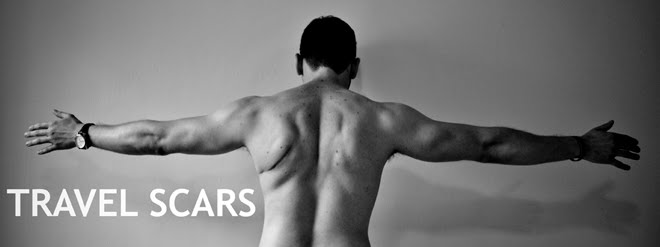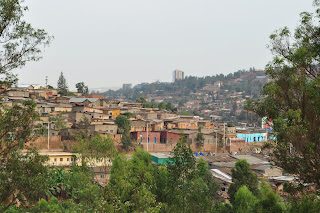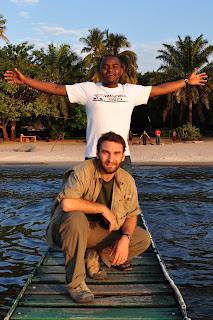Our decision to wake up and make our way to the football stadium was an easy one: the prospect of seeing political history first-hand was more than alluring.

We arrived at the stadium and joined a long queue winding around the block. We were the only white people in the line: there were thumbs-up of approval but also mutterings of mzungu (yes, it's used in Rwanda as well) and confused looks.
The line was not moving so Erik went in search of another entrance and came back shortly with a smile on his face. We left the queue and made our way to Erik's find.
The guard ushered us into a line with other Caucasians. Erik's safari-gear and my torn camouflage shorts did not coincide with the suits and gowns worn by the other people in line. Nevertheless, we were still searched by security and let onto the stadium grounds. People were filing up the stairs, making their way to their seats within the stadium. We questioned several people as to where the general public could sit but were informed that it was already full. We then tried to follow the other foreign guests but were promptly asked to show our invitations which we obviously didn't have.
We were then led to a field with a projector screen where hundreds of thousands of Rwandans were anxiously awaiting the inauguration to commence. A young child handed me a Rwandan flag and we sat in the dry grass and waited. Erik started to feel uncomfortable and said that some Rwandans were being hostile. He suggested we try to get into the stadium again. I refused. As interesting and historic as sitting in that stadium would have been, we did not have invitations to sit among the foreign guests and I wouldn't feel comfortable unjustly occupying seats for Rwandans who truly believe in and love this man. He was their President, their hero. Not ours.

After a small argument between Erik and myself, we agreed to leave the grounds and watch the inauguration on television instead. Chez Lando, a nearby bar and place mentioned by the witness testifying in the war crimes tribunal in Arusha, seemed like a good venue to watch the celebration. We cracked open our first 720ml beer at 9:30am and by the end of the ceremony, we were really into it.
Following the Presidential intoxication, I mean inauguration, we boarded a bus to Ruhengeri, now known as Musanze in post-genocidal Rwanda. Ruhengeri is the jumping-off point to Parc national des Volcans, the Rwandan portion of the Virunga Conservation area, partitioned between Uganda, Rwanda and the DRC. This region is the only place on earth where you can see Mountain Gorillas. Currently, between the 3 countries, it is estimated that only 700 of these majestic primates remain despite rigorous conservation efforts.
We managed to find a guesthouse which only cost us 2$ a night, the only provision was that Chris and I share a large single bed: we preventatively constructed a blanket barrier between us to prevent one another from crossing onto the other person's half.
We had one day to kill before our Gorilla trekking adventure so we had planned on visiting a scenic lake but unfortunately confusion prevailed and Erik got separated from us, so we just decided to drink beers instead.
They call Rwanda Pays des Milles Collines (country of 1000 hills) and the landscape is incredibly lush and beautifully picturesque. And nothing is more beautiful than the landscape of the National Park: with its cloud-covered volcanoes and dense green forests. The remote mountainous environment and abundant vegetation make it the ideal habitat for these 400-pound animals.

We had hired a driver and 4x4 which is bewilderingly not included in the 500$ price-tag of the permit and it picked us up in the morning. The nausea-inducing, rock-ridden road leading to the National Park gate was lined by many charming villages and waving groups of children. The fact the Rwanda is only 26,338 square kilometers (the size of Haiti) and the population is roughly a quarter of Canada's makes the population-density of the country staggeringly high.

Our driver had arranged for us to visit the Amahoro group, the third largest of all the groups in Rwanda. We were joined by Nell, an American traveler; and two other couples. The 8 of us were led through the bush by several armed guides.


The hike itself wasn't that difficult but the thickness of the vegetation and volcanic mountains made it quite a remarkable experience. After an hour-and-a-half of steady-climbing, we reached the group of trackers (the men who locate the various groups of Gorillas).


We left our belongings with the trackers and approached the Amahoro gorillas, armed only with our cameras. We were permitted to stay with the group for no more than one hour, were to avoid loud noises, getting closer than 7m; and to avoid flash photography. If, however, the gorillas get curious, they are allowed to get closer to you, but on their own terms.


Needless to say, standing a few feet away from a 450-pound male Silverback Gorilla is an incredibly exciting experience. What makes observing these animals so incredible is how close you are to them and how indifferent they are to your presence despite your proximity to them.


The similarities to human behaviour and interactions are really remarkable and the sheer size and power of these animals is indescribable.


The hour spent with these beautiful creatures past way too quickly, but I said my silent goodbyes and considered how privileged I am to have been able to do this.


God forbid, but these Gorillas may not be around in 50 years if poaching escalates or war breaks out in this fragile region.

We were later dropped off in Ruhengeri but found out there was a night bus leaving to Kampala, Uganda in less than an hour. We decided that it would be beneficial to take it and said farewell to a country with so much to offer, so much promise.


Typically, when someone mentions Rwanda, the first thing that comes to mind is the genocide. I do understand that it plays a huge role in the country's politics and social consciousness, but when I think of Rwanda, I will think of its beautiful people, landscapes and the incredible Mountain Gorillas, who I hope will remain in the misty forests of the Volcano National Park for centuries to come.



























